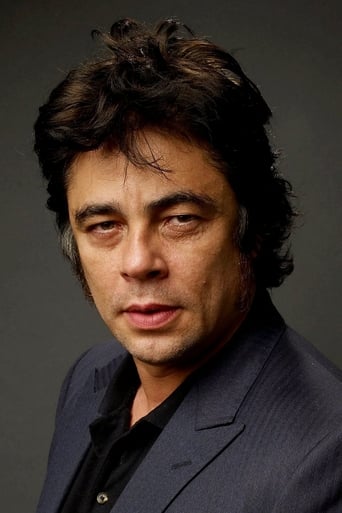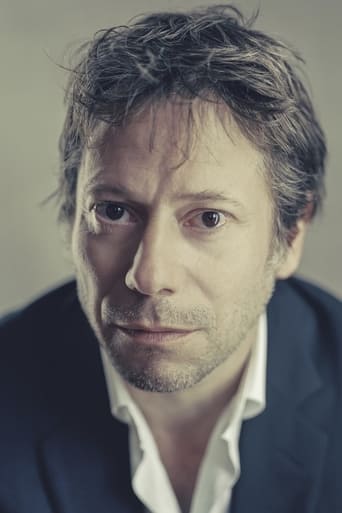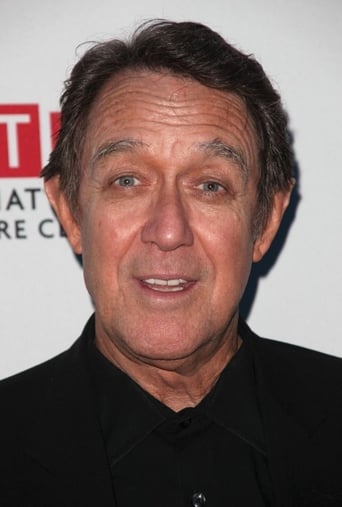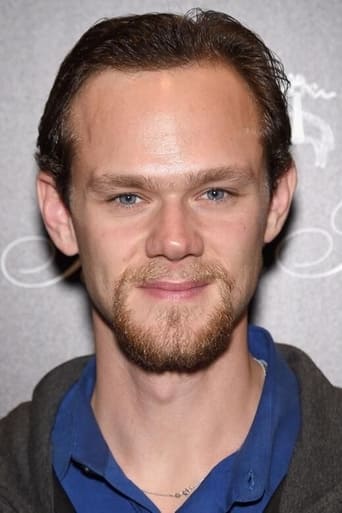Hellen
I like the storyline of this show,it attract me so much
Phonearl
Good start, but then it gets ruined
Myron Clemons
A film of deceptively outspoken contemporary relevance, this is cinema at its most alert, alarming and alive.
Ortiz
Excellent and certainly provocative... If nothing else, the film is a real conversation starter.
alevinadresi
The other reviewers already provided extensive descriptions about the movie's plot and characters. So I will just skip it. This is a slow-paced movie but it flows in its own pace and takes you with it. There are some parts that you can relate to yourself, even though you are not a traumatized veteran, that makes you go "ahhh I know the feeling" or "It happens to me, too". I loved the way the dreams were shown to the audience. That made the movie more interesting and fun to watch for me. Benicio Del Toro was great as always. He adjusted himself to the slow-pace of the movie so well that it feels so natural. And thank God that I finally could see him at least kiss a lady in a movie. Hallelujah! Although at times, I must admit it was hard to believe that he was Native Indian, especially in the scenes when he is surrounded by real Native Indians, he still pulls it so well and gives a terrific performance, so much that you feel for him, and believe that he is in fact a person with a soul pain. I also loved how well Mathieu Amalric played the eccentric anthropologist although his character's eccentricity was a bit of cliché. He still managed to make me believe in his role. All in all, if you are not into fast-paced action movies or movies with a surprise unexpected turn of events, but more inclined to watch real world movies with a human touch, than you should give this one a chance.
ksf-2
I've always enjoyed and believed Benicio Del Toro in the roles he plays. Here, he plays a very careful, methodical Native American, Jimmy Picard,who has clearly been affected by his military service. When the "regular" doctors don't know what to make of him, he is examined by a Mojave Indian Georges Devereux (Mathieu Amalric), who may or may not be who he claims to be. They spend a lot of time showing and examining dreams. This makes sense, since dreams play such a large part of both the Native American and the psychology culture. At 117 minutes, it IS pretty long. But it's certainly entertaining; a mix of Native American culture and the psychology. You can make what you want out of the dreams, but each one is its own little story. Directed by Frenchman Arnaud Desplechin. This is currently showing on netflix. I'd like to see some of his other projects.
Steve Pulaski
The visuals in Jimmy P: Psychotherapy of a Plains Indian are almost, almost worth the price of admission. The opening scene of the film beautifully articulates setting and irony by showing the grassy plains of America while Native American flute music is played in the backdrop. It's a comforting, soft opening to a film that is erected predominately off of complex discussion and ideology.The film stars Benicio Del Toro in a role he clearly embraced and enjoyed, playing Jimmy Picard, a Blackfoot Indian, who has returned from war with seriously debilitating symptoms, most specifically, a crippling headache. Jimmy is placed under the care of George Devereux (Mathieu Amalric), a real-life French doctor and anthropologist, who specializes in ethnology and psychoanalysis. The two meet together and form a quaint bond between their lengthy discussions about Native American history and culture, stemming from Devereux's desire to learn about the culture, as an anthropologist often does and Jimmy's checkered past, which involves troubled love and a teenage daughter that another man is raising.With the right directorial methods and smooth, engaging writing, Jimmy P. could easily be a film that one can effortlessly sink into, investing in its characters and learning a thing or two about psychological methods. It just so happens that my semester of high school psychology delved into Freudian ideas and psychoanalysis quite extensively, both principles are based on three key ideas: the inner conscious and unconscious act as dueling forces in the mind, the discussion and population of defense mechanisms in order for people to cope or estrange themselves from their past, and the idea that dreaming means more than disjointed shows that play in your head while you sleep.Making a film centered around often complex and occasionally droning material, especially when that film is about the founding days of a division in psychology, is unbelievably challenging, so based on that, it's surprising to say Jimmy P. succeeds as well as it does. French director and co-writer Arnaud Desplechin (who wrote the film with Julie Peyr and Kent Jones, respectively) does all he can to make the film as absorbing as possible, and for the first hour or so, his efforts are effective, as we watch Jimmy and Devereux invest in some great conversational banter that is geared more towards cultural relativism than it is in trying to structure cheap and expected payoffs. However, the film runs out of gas when you realize just how stiff and frequently dull the material gets. Perhaps it really is no fault of the trio of writers, nor Desplechin himself, but the fact that the ideas presented in the film are difficult to make engaging on an entertainment level.Jimmy P: Psychotherapy of a Plains Indian works for a little while because it's interesting to see how a significant subsector of psychology was born by a doctor who was clearly interested in learning about different walks of life and the makeup of cultures and people of groups he didn't belong to. Amalric embodies the mindset of an anthropologist/psychologist quite nicely here, effectively making for a character we can appreciate. However, the stiffness of the film catches up to it, with the film's discussions in its second and third act becoming greatly long-winded and the entire project slowly running out of steam before reaching the conclusion. Rather than rewarding and captivating, the ending comes off a long-awaited conclusion to a film that was so close to making a film about psychology absorbing for two hours.Starring: Benicio Del Toro and Mathieu Amalric. Directed by: Arnaud Desplechin.
sfviewer123
An intellectual labor of love in which the director tries to recreate the psychotherapeutic relationship between a French psychoanalyst (in reality a Hungarian-German Jew who converted to Christianity) and a Blackfoot Indian vet suffering from inexplicable symptoms in the late 1940s in a VA hospital in Topeka, Kansas.Played by Benicio del Toro (who is Puerto Rican) and Mathieu Almaric (who is half-French half-Polish Jewish), the film drags at times but does delve into some interesting psychological (although of course it goes *much* more seamlessly/painlessly than most analyses in reality).Almaric's character wins over Del Toro's with his initial knowledge of Native American cultures (actually Mojave but there are parallels to the Blackfoot). From there he tries to synthesize his anthropological knowledge with what seem to be a pretty standard fare of sexualized Freudian clichés (witnessing the primal scene, explicit discussions of vaginas (which I thought Del Toro's character spoke about far too easily for the mores of that day and age)).The relationship between the two men are supposed to be a life-changing event but I felt the film fell a little short in depicting that reality (also a film review (for which I know the director is not responsible) described their friendship as resulting from their both being outsiders, but Almaric's character never reveals his true background (his lover mentions at one point the fact that he changed his name but that is it, perhaps there were other scenes that didn't make it past the editor (I went to the premiere in NYC with the director and main actors and they said there are a lot of scenes that got cut)).In the latter part of the movie there are strong hints that Jimmy's (Del Toro's character) headaches, fits of rage and alcoholic binges are the result of systematic sociopolitical mistreatment of native Americans but the subject is only strongly hinted at, not really discussed explicitly by Jimmy in any deep or meaningful way. This was to me perhaps more interesting than the anthropological Freudianism of the first 90 minutes of the film, but the director was trying to adhere to a book on the subject and real-life events (psychology back then was even more grossly unaware of psychopolitical factors compared to now).Perhaps subtly discourages the notion that Jimmy is suffering from PTSD (a diagnosis which did not exist at the time, but the phrase "shell shock" is not used either) because he never saw combat or killed anyone (he was involved in mine-clearing operations after the German retreat). Also interesting insofar as his injury was to his head, thus perhaps implicitly challenging the often presumed relationship nowadays in vets between TBI (traumatic brain injury) and PTSD? (Then again the director was following real-life events so I don't know his intentionality.)A worthwhile film but a little odd insofar as it (to me) underemphasizes the ethnocultural forces in the characters in favor of a "special friendship" (in a universalized way) despite the fact that it is the decultured nature of American psychiatry which was at the root of doctors' inability to help Jimmy in the first place. Also couldn't stand the way a couple of actors (thinking of Almaric and Joseph Cross specifically) who think that acting means being as anxious and/or intense as possible in every scene.P.S. The film does drag a bit (114 minutes) (I'm not someone who normally complains about "art-house" films with slower (French) pacing either.)





